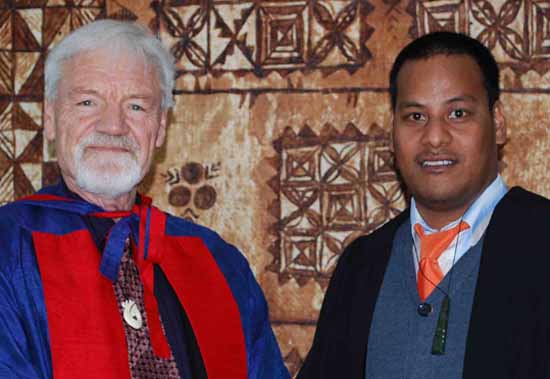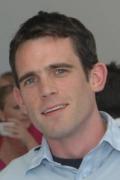
Kiribati Independent editor Taberannang Korauaba, who graduated with a masters degree in first class honours at AUT University on Friday, has called for urgent media action over climate change in his Pacific nation.
"The people of Kiribati aren't united on climate change," says Korauaba.
"This is the media's role but in Kiribati this role has not been realised by the government.
"The phrase 'disappearing nations- often invoked by President Tong and foreign news media - undermines the people's ability to learn about climate change."
A former contributing editor of Pacific Media Watch, Korauaba has been editing the independent publication from Auckland for the last two years as he has been completing his Masters in Communication Studies (MCS).
The thesis, entitled Media and the politics of climate change in Kiribati, analyses the media’s role in reporting the issues, a major cause for concern for the country.
"It shows that we Pacific people in Kiribati can tell our stories better than others. Though the people of Kiribati and their media are aware of the danger posed by climate change, that awareness could have been changed to 'action' had the Kiribati government carefully and thoroughly planned its climate change campaign from day one.
Participants credited
"The thesis achievement should also be credited to the participants in Kiribati who have given up their time to share their views with me during my fieldwork last year."
Last year, the country hosted the United Nations Secretary-General, Ban Ki Moon, who repeated calls for the region to take notice of a problem that was not just on the horizon but already making an impact on the lives of Kiribati citizens.
Korauaba argues that traditional, cultural and religious beliefs about land, the environment and the sea could act as barriers to progress.
He also found the government’s “top-down” approach to communication has restricted the media’s access to information and thus prevented the media from playing its role as a responsible provider of public information.
One of Korauaba's examiners described the thesis as a “call to action” over climate change.
A highly experienced international examiner of Pacific theses, she said Korauaba’s “response to this major Pacific - and development – issue is original, well-argued, comprehensive and creative in its design and bold in its application”.
His primary supervisor, Professor David Robie, said Korauaba had “thrown down the gauntlet” in a very constructive way to the Kiribati media fraternity on how they could "up their game” in tackling climate change for the country’s future.
Sharing knowledge
"Tabs is very committed to sharing this knowledge with the media and the community in Kiribati and I hope he gets the opportunity to do this," he said.
The PMC hoped to work with Korauaba to publish a climate change booklet.
One of the novel features of Korauaba's research was his application of a deliberative journalism model using a traditional karoronga cultural concept.
Previously an AUT/Pacific Islands Media Association (PIMA) scholarship winner, Korauaba was awarded a bachelor of communication studies (honours) degree in 2007.
Korauaba will now focus full-time on his role at the Kiribati Independent, which has recently faced publication restrictions in Kiribati for the print edition.
The online version which is operated from Auckland can be accessed here.



